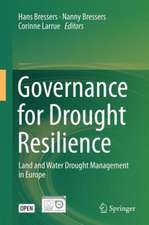Water Governance as Connective Capacity
Autor Nanny Bressers Editat de Jurian Edelenbosen Limba Engleză Paperback – 11 noi 2016
| Toate formatele și edițiile | Preț | Express |
|---|---|---|
| Paperback (1) | 469.34 lei 6-8 săpt. | |
| Taylor & Francis – 11 noi 2016 | 469.34 lei 6-8 săpt. | |
| Hardback (1) | 1063.41 lei 6-8 săpt. | |
| Taylor & Francis – 18 apr 2013 | 1063.41 lei 6-8 săpt. |
Preț: 469.34 lei
Nou
Puncte Express: 704
Preț estimativ în valută:
89.82€ • 97.53$ • 75.45£
89.82€ • 97.53$ • 75.45£
Carte tipărită la comandă
Livrare economică 22 aprilie-06 mai
Preluare comenzi: 021 569.72.76
Specificații
ISBN-13: 9781138252059
ISBN-10: 1138252050
Pagini: 376
Dimensiuni: 156 x 234 mm
Greutate: 0.45 kg
Ediția:1
Editura: Taylor & Francis
Colecția Routledge
Locul publicării:Oxford, United Kingdom
ISBN-10: 1138252050
Pagini: 376
Dimensiuni: 156 x 234 mm
Greutate: 0.45 kg
Ediția:1
Editura: Taylor & Francis
Colecția Routledge
Locul publicării:Oxford, United Kingdom
Cuprins
Contents: Introduction: conceptualizing connective capacity in water governance, Jurian Edelenbos, Nanny Bressers and Peter Scholten; The role of political-public leadership for connective capacity in water governance, Peter Scholten and Jurian Edelenbos; Connective capacity in a dynamic context: changing water governance structures in Romania, Joanne Vinke-de Kruijf, Stefan Kuks and Denie Augustijn; Connecting multiple levels of governance for adaptation to climate change in advanced industrial states, Carina Keskitalo, Sirkku Juhola and Lisa Westerhoff; Framing and linking space for the Grensmaas: opportunities and limitations to boundary spanning in Dutch river management, Jeroen Warner; The climate game: connecting water management and spatial planning through simulation gaming?, Qiqi Zhou, Geertje Bekebrede, Igor Mayer, Jeroen Warmerdam and Maxim Knepflé; Connecting levels and disciplines: connective capacity of institutions and actors explored, Yvette Bettini, Jeroen Rijke, Megan Farrelly and Rebekah Brown; Short-term and long-term tensions in water programs: the role of leadership and organization, Nanny Bressers and Ytsen Deelstra; Connecting long and short-term via envisioning in transition arenas, Josee van Eijndhoven, Niki Frantzeskaki and Derk Loorbach; Connecting time spans in regional water governance: managing projects as stepping-stones to a climate proof delta region, Corniel van Leeuwen and Arwin van Buuren; Framing strategies and connective capacity in water governance policy: the case of the Second Delta committee, Simon Verduijn; Bridging knowledge frames and networks in climate and water governance, Art Dewulf, Marcela Brugnach, Catrien Termeer and Helen Ingram; Values connecting societies and water systems, Jacko van Ast, Jan Jaap Bouma and Mansee Bal; Creating legitimacy in water governance networks through complexity sensitive management, Jurian Edelenbos, Ingmar van Meerkerk and Erik Hans Klijn; The influence of connective capacity on the legitimacy of flood management, Miriam Cuppen and Joanna Pardoe; Great Lakes water governance: a transboundary inter-regime analysis, Cheryl de Boer and Gail Krantzberg; Conclusions: towards a synchronization perspective of connective capacity in water governance, Jurian Edelenbos, Nanny Bressers and Peter Scholten; Index.
Recenzii
’Water governance is becoming one of the most significant challenges of this century and our current technocratic and fragmented approaches are ill prepared to respond. This superbly organized book draws on a rich array of theory and applied research from Europe, North America and Australia. For anyone involved in the policy, management and governance of water, this book not only explains the most important challenges, but also provides valuable guidance on the effectiveness of water governance approaches.’ Richard D. Margerum, University of Oregon, USA and author of Beyond Consensus: Improving Collaborative Planning and Management 'The interconnectivity aspect of water governance is the main topic of this book, which is structured in a remarkably systematic way ... No doubt this is a most welcome book for ’anyone involved in the policy, management and governance of water'. International Journal of Environment and Pollution
Notă biografică
Jurian Edelenbos, Nanny Bressers, Peter Scholten
Descriere
Bringing together case studies from countries including The Netherlands, United Kingdom, Romania, Sweden, Finland, Italy, India, Canada and the United States, the book focuses on the question of how to deal with the various sources of fragmentation in water governance by organizing meaningful connections and developing 'connective capacity'. In doing so, it provides useful scientific and practical insights into how 'connective capacity' in water governance can be enhanced.





















